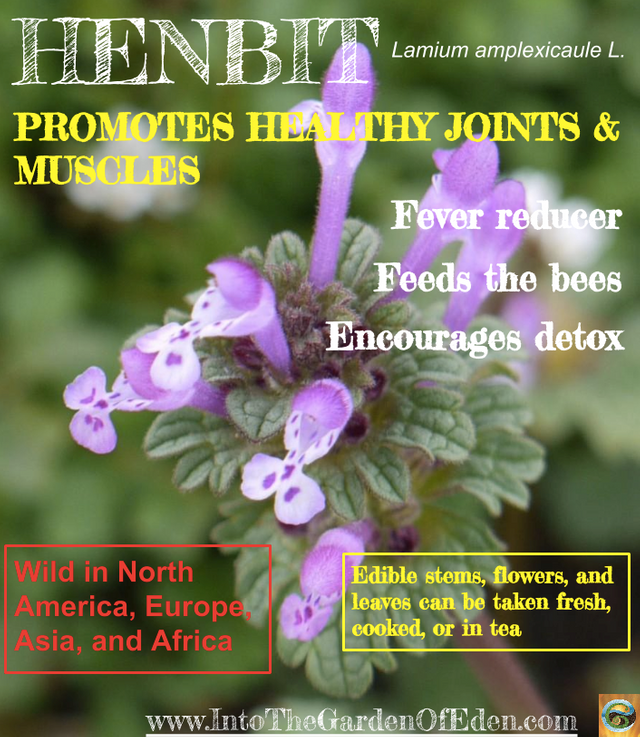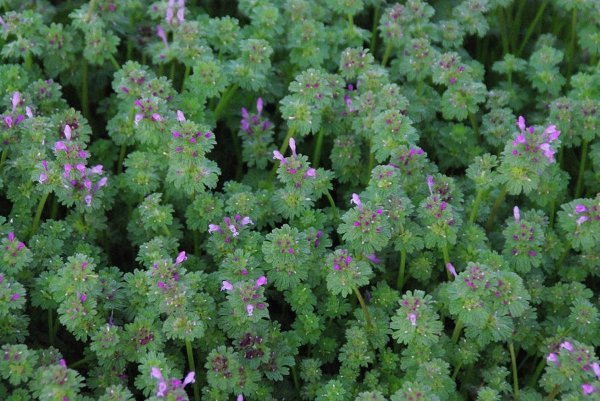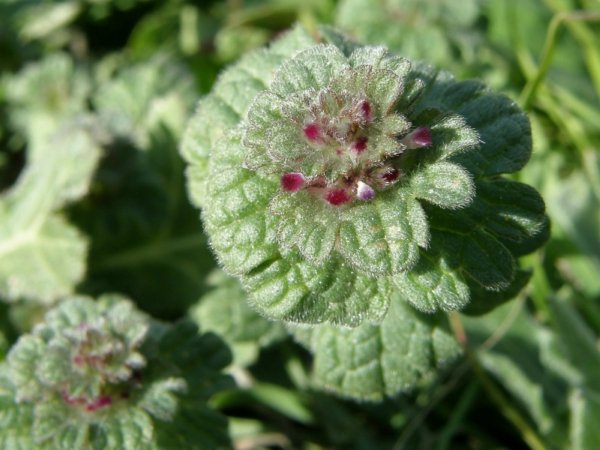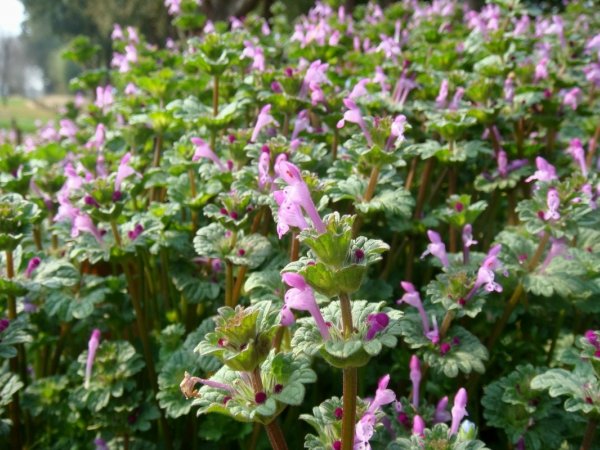Almost everyone recognizes henbit, though few know it by name (scientific name Lamium amplexicaule L.). It pops up unbidden in lawns and garden beds, but to treat this relative of mint as if it were a common weed is profane.

Henbit has square, hollow stems that can be green to purplish. The plant is sparsely covered with fine hairs. It has distinctive "collars" of oppositely-placed petals up the stem. Lower leaves are attached to the main stem by a wee little stalk called a petiole, but upper leaves are directly attached to the stem (that is to say, they are sessile). Leaves are broad and green, with deep veins and scalloped edges. Henbit has distinctive whorls of tiny, spotted, tubular pinkish to purple flowers.
Henbit is high in iron, fiber, and antioxidants.
Henbit has edible stems, leaves, and flowers. Add it to salads, sandwiches, and smoothies. Fresh leaves can also be used to make a tea!
A poultice of henbit can treat external bleeding, burns, bruises, stings, and wounds.
As the name suggests, chickens love it. It's also a source of nectar for bees, so keep it around to support bee populations.

Henbit has healing powers:
- anti-rheumatic = relieves chronic pain and discomfort in joints and connective tissue
- anti-inflammatory
- diaphoretic = induces sweating
- febrifuge & antipyretic = reduces fever
- gentle laxative
- astringent = causes the contraction of tissues
- vulnerary = useful in healing of wounds
- tea can be used to treat diarrhea


Considering the powerful medicinal properties of this sweet little herb, it makes sense to treat henbit with the respect it deserves!
Sources:
- Henbit: Top of the Pecking Order. by Green Deane from Eat the Weeds, and other things, too.
- Henbit: Lamium amplexicaule L. from Edible Wild Food.
- Henbit. by Morgan E. Judy from Clemson Cooperative Extension.
- Lamium amplexicaule | Henbit | Skinned Rabbits. from Survival Plants Memory Course.
www.intothegardenofeden.com

Yay!!! Bringing more awareness to the powerful wonders of mother nature.!! Our medicine is all over the place! Thanks for posting this!
Downvoting a post can decrease pending rewards and make it less visible. Common reasons:
Submit
May everyone understand that health is easy and accessible~
Downvoting a post can decrease pending rewards and make it less visible. Common reasons:
Submit
how amazing that the earth provides what we need to be happy and healthy.
Downvoting a post can decrease pending rewards and make it less visible. Common reasons:
Submit
We are truly blessed!
Downvoting a post can decrease pending rewards and make it less visible. Common reasons:
Submit
Another one added to the list cool!
Downvoting a post can decrease pending rewards and make it less visible. Common reasons:
Submit
Happy foraging!
Downvoting a post can decrease pending rewards and make it less visible. Common reasons:
Submit
STOP mowing your lawn! STOP going to your doctor! All your medicine grows around you naturally. Grass? Do we really need all that grass?
Downvoting a post can decrease pending rewards and make it less visible. Common reasons:
Submit
We'll do our best to keep sharing a better way! The "weeds" have super powers.
Downvoting a post can decrease pending rewards and make it less visible. Common reasons:
Submit
Yes I Agree Cool
Downvoting a post can decrease pending rewards and make it less visible. Common reasons:
Submit
The healing power of plants is super awesome! Nature provides everything we need.
Downvoting a post can decrease pending rewards and make it less visible. Common reasons:
Submit
Good work what you do!!
Downvoting a post can decrease pending rewards and make it less visible. Common reasons:
Submit
Thank you!
Downvoting a post can decrease pending rewards and make it less visible. Common reasons:
Submit
need this in my jelly
Downvoting a post can decrease pending rewards and make it less visible. Common reasons:
Submit
foraging is so much fun. i love the posts that add to the list of things to look for.
Downvoting a post can decrease pending rewards and make it less visible. Common reasons:
Submit
Great, we're grateful we can share this info with those who appreciate it!
Downvoting a post can decrease pending rewards and make it less visible. Common reasons:
Submit
there's some sort of toadflax that i've always confused with henbit. this article helped clear up the differences for me. thanks!
Downvoting a post can decrease pending rewards and make it less visible. Common reasons:
Submit
Such a wonderful article, full of knowledge. It is a pleasure to read your articles. It is not very usual in our region (Central Europe), but I can remember I saw it somewhere. Will post inspired article soon as one is already prepared to be published - Mullein :-)
Downvoting a post can decrease pending rewards and make it less visible. Common reasons:
Submit
This is a great little member of the Mint family. All the mints have the square stems, so it's easy to tell one of family. I have more of the red henbit at my place in Oregon's Willamette valley. It's also called henbit deadnettle or purple deadnettle (Lamium purpureum). I put it in my salads and smoothies in late winter and early spring, and cook in a mixed pot of greens, too. The bees love it, though, and need all the food they can find on the nice days at that time of year, so I don't harvest it as much as chickweed and other early spring greens.
I get a lot of Persian speedwell (Veronica persica), too. It's not toxic, but it tastes (to me) like menthol cigarettes and gasoline! It does make a tasty tea, though. It's a great example that knowing how to use a plant is as important as being able to identify it.
Enjoy your henbit bounty!
Downvoting a post can decrease pending rewards and make it less visible. Common reasons:
Submit